Sustainability at RSU: how it is implemented and why it is important
Writer: Linda Rozenbaha, RSU Public Relations Unit
Photo from RSU archive
All universities shape the future, because students will be the people who influence their country and the world for many years to come. Taking care of a sustainable environment at the university means taking care of this future world, which will be shaped by our students and teaching staff. This care demonstrates the ability to be responsible and far-sighted.
In a series of articles, we will explore what has been accomplished and implemented at Rīga Stradiņš University (RSU) in terms of creating a sustainable environment and management practices.
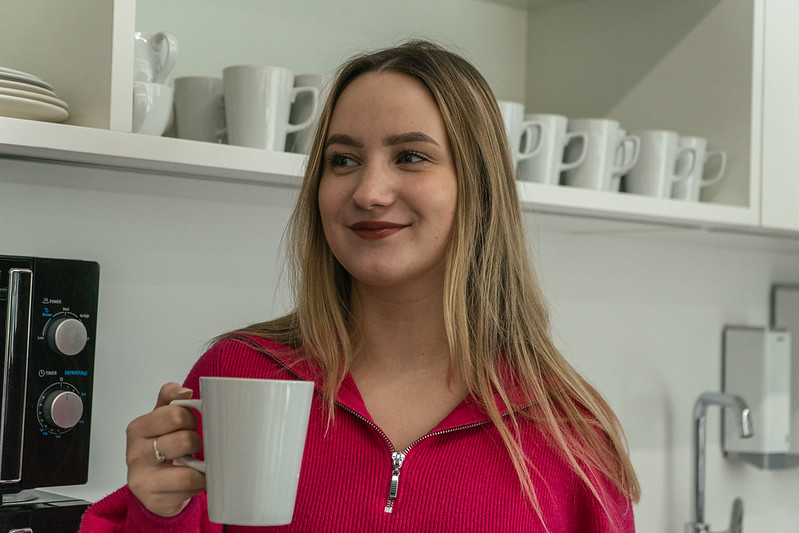
In this article we will answer the question why sustainability is important for RSU, outline what we are doing, and plan to do.
Dainis Zemešs, Director of the RSU Department of Infrastructure, believes that investing in sustainability has gradually become the norm and, in his opinion, there is no need to explain why it is important: ‘There is already an awareness in both the scientific community and in society about the impact of waste and different types of pollution on global climate and the importance of sustainable management. RSU is international, and international students in particular expect an environment that is not only modern, but also eco-friendly.’
Laila Skrodele, Head of the Building Management and Maintenance Unit, notes: ‘At RSU, we are the leaders in many areas, including sustainability, where we are the leaders in Latvia.
Others are very impressed with what we are doing. And we have chosen to do more for the environment than we are asked to do.
For example, we go beyond what is required by law in waste sorting.’
RSU’s sustainability activities have also been recognised with an award: In 2023, RSU was awarded the Latvian Sustainable Governance Award for Growth introduced by the Bank of Latvia and the Corporate Governance Advisory Board. The award was given to the University for promoting development in sustainable governance and growth matters, for improving corporate governance, and for ensuring that the predefined values are respected in its activities.
An improved sustainable environment at the University is good for university rankings. ‘The technical and management performance of the infrastructure plays a key role,’ explains Zemešs. ‘In the QS Sustainability Ranking, social impact accounts for 45% of the score, climate and environmental impact for 45%, and governance for 10%. In another ranking, The Impact Ranking, sustainable development goal (SDG) 17 – Partnerships for the Goals has a weight of 22% and the other 16 UN SDGs have the same weight (26%). The ranking reflects the average of the previous two years.’
This year, regular expert discussions have taken place with a focus on sustainability issues. ‘We are still working to get complete feedback and specific conclusions on what we are already doing well and what needs to be improved. Of course, we already knew a lot of what was said, but the discussions allow for us to take a broader view and we will be able to take additional steps. It’s good to see, accumulate and analyse data,’ says Zemešs.
Some narrower areas such as heating, electricity, water consumption, waste volumes, etc. have been evaluated.
Waste sorting and clean water
We care for the environment in both more significant aspects as well as seemingly small things that nevertheless create significant positive indicators. For example, there are no disposable cups at drinking water points at RSU. This encourages everyone to use reusable containers and not pollute the environment. Additionally, there are no waste bins under desks.
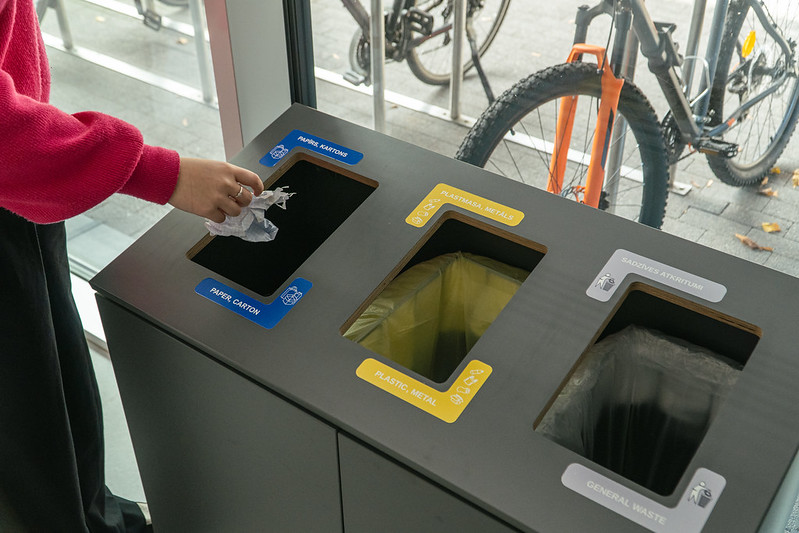
‘We sort waste immediately at the source – everyone goes and disposes of waste in appropriate containers,’
Skrodele explains. And it saves time too as cleaners don’t have to crawl under desks to retrieve individual bins. The collection of sorted waste is provided for free, and we only pay for household waste collection.
The first water filter was introduced in 2012 and quality drinking water is available free of charge in RSU buildings.
Renewable energy
RSU has implemented and is committed to continue to implement energy-efficient solutions that form the basis for rational and efficient use of energy and will ensure a long-term reduction in the University’s energy consumption.
Andis Miončinskis, Head of the Technical and Transportation Unit, notes that since 2017, RSU has implemented and certified an energy management system in accordance with international standard ISO 50001. ‘This means that we record and analyse energy efficiency data and look for steps we can take to improve efficiency even more.
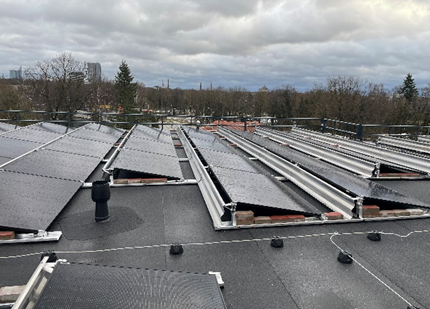
For example, we can see savings in the data for the building at 3 Hipokrāta iela, but also system errors that we can correct or improve to see what results we can achieve,’ Miončinskis explains.
During the heating period, the temperature at RSU premises is lower at night, as well as on weekends. ‘The savings this creates are quite significant,’ Miončinskis has calculated.
Another innovative resource-saving solution that has been introduced is the reuse of wastewater for irrigation.
‘For example, the systems of Riga city have a limited capacity to capture rainwater. We have devices in place to store water for several days after heavy rainfall. When we need to use that water somewhere, we have it on hand, so we don’t have to water our flower beds with drinking water, for example’ says Zemešs.
Another step: the first solar park was constructed at 30 Kristapa iela in 2023. In 2024/2025, solar panels will be installed at 12 more RSU facilities.
Electric vehicles
The environment is a consideration when building out the University’s car fleet. ‘We currently have eight electric vehicles in use. We can see the benefit of using electricity in this way – by not burning fuel, we reduce CO2 emissions,’ says Miončinskis.
Green procurements
For several years, we have been applying green procurement principles to purchases relating to cleaning and electricity servies. The number of green procurements at RSU is increasing. For example, in the construction sector, the green procurement component is already mandatory, e.g. the contractor must draw up a waste management plan for the construction site in the application.
Green living
In order to take care of sustainable use and management of terrestrial ecosystems, a green area of 1.3 hectares – Inspiration Park – has been landscaped between the RSU Main Building at 16 Dzirciema iela and the adjacent student hostel. It is freely accessible not only to students and staff, but also to residents of the neighbourhood and pupils at the neighbouring secondary school.
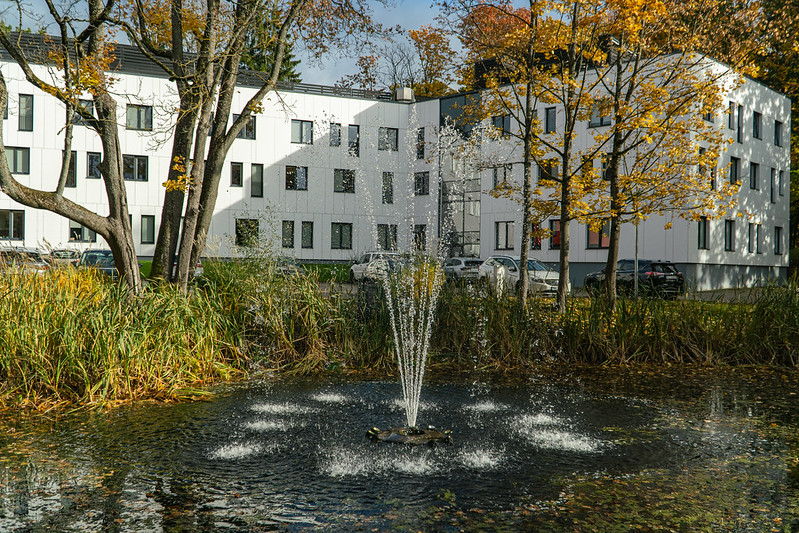 ‘We have installed a fountain in the pond in Inspiration Park, which not only serves a visual purpose, but also aerates the pond and humidifies the air. We have well-maintained green areas for benches and greenery,’ says Zemešs.
‘We have installed a fountain in the pond in Inspiration Park, which not only serves a visual purpose, but also aerates the pond and humidifies the air. We have well-maintained green areas for benches and greenery,’ says Zemešs.
Outside the city, in the green and picturesque Vecpiebalga Valley of Taurene Parish, lies the RSU recreation and sports base Taurene, with a total area of 8.64 ha. Currently, 76.8% of the total area of this sports base is dedicated to green space.
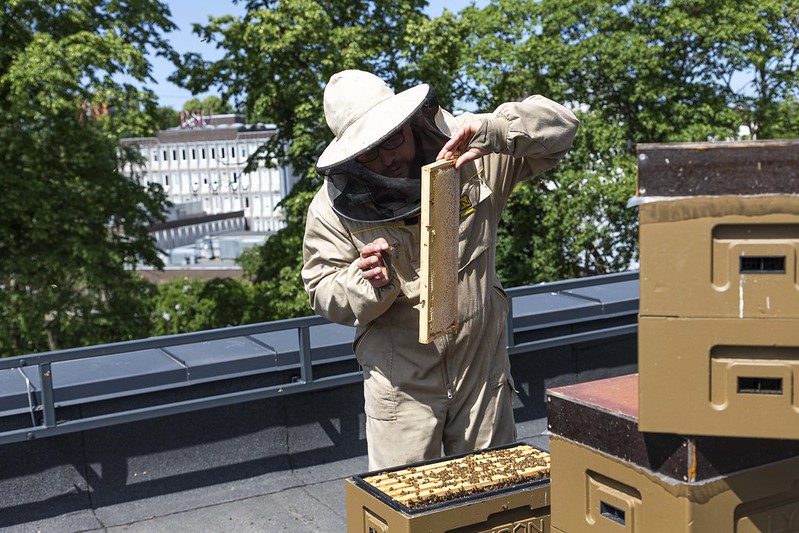
Additionally, green urban farming is taking place on top of the building of the Pharmaceutical Education and Research Centre on Konsula iela – a beekeeper puts up bee colonies during the summer!
Involving people
RSU tries to involve RSU students and staff into various aspects of sustainability. ‘For example, the building on Konsula iela has a solar panel park on the roof. A video screen in the building’s leisure room shows the current usage of solar energy. In this way, it engages visitors,’ says Zemešs. RSU also organises educational meetings and sends out emails to educate RSU students and staff about how RSU cares for the environment and how anyone can get involved.
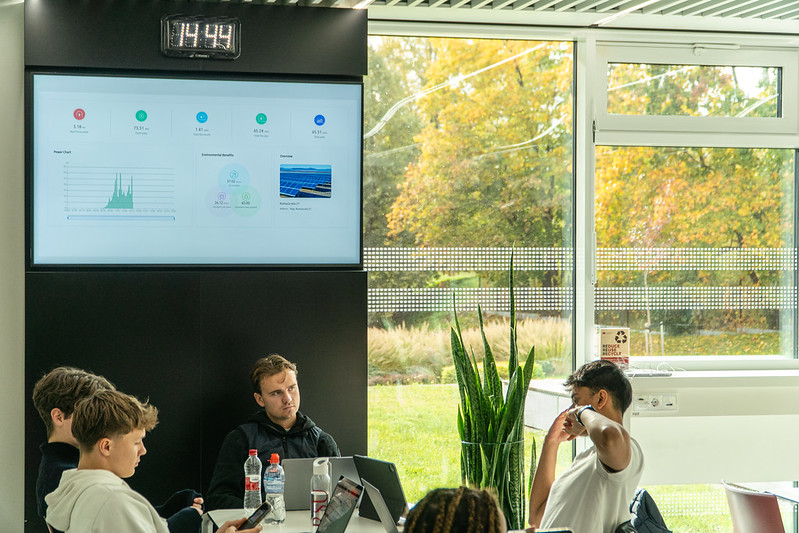
Since 2012, when the first water filter was introduced, people have become increasingly aware and receptive to green ideas. Companies involved in project implementation have also become more educated – for example, contractors no longer wonder how to prepare a waste management plan for a construction site.
There are more ideas for how to improve sustainability in the future. ‘For example, the idea of using a deposit system for food containers for takeaways in the cafeteria that can be returned and reused, has not yet gone down well in cooperation with our food providers. Our motto is that we are leaders, we do things differently, we lead by example, we don’t stagnate,’ says Skrodele.
One ambitious sustainability plan is the construction of a huge sports complex on Cigoriņu iela, scheduled for completion by the end of 2026. When green ideas are first introduced, they are not always financially beneficial – it is only over time, as others become involved in bringing ideas to life, that the costs can become lower.
Andis Miončinskis adds:
‘RSU values good ideas, they are actually heard and supported. This inspires us for future projects.’
Dainis Zemešs sums up: ‘Many ideas come from personal experience, brainstorming with professionals and at conferences. For example, the idea about recovering heat from shower wastewater at the Dārza iela student hostel comes from a conference. Learn about innovation, find out how to implement it, get support and make it happen!’
Related news
 Time capsule laid at ceremony for construction of new RSU sports complexFor Students, Consolidation, For RSU Employees, Internal consolidation, Development
Time capsule laid at ceremony for construction of new RSU sports complexFor Students, Consolidation, For RSU Employees, Internal consolidation, Development


